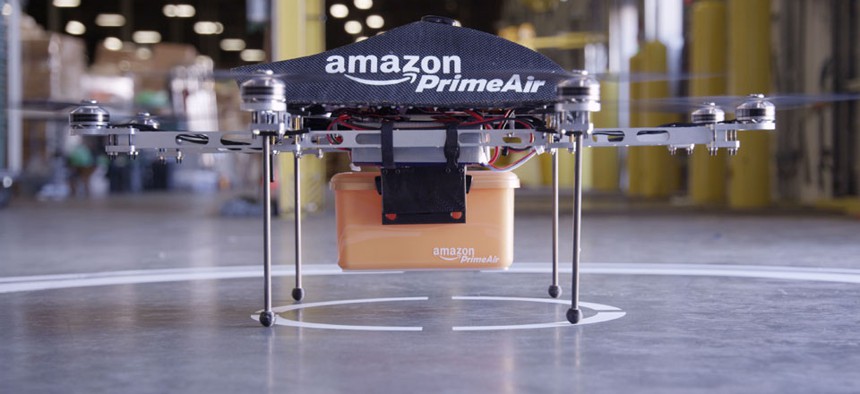A Quick Review of Where Commercial Drones Stand

Amazon
The FAA wants to clear up the confusion. Here's a helpful guide.
Jeff Bezos isn't the only one who thinks drones will power tomorrow's businesses. But as more companies incorporate drone delivery or photography into their plans, it's still unclear what they're allowed to do.
"There's a lot of misinformation and misunderstanding in the [drone] user community," acknowledged Federal Aviation Administration spokesman Les Dorr. The agency wants to clear up the confusion. So here's a helpful guide:
I have a brilliant idea for how drones can help my business. Am I good to go?
Not unless you're operating in the Arctic. So far, the only operation that has received the necessary FAA clearance for commercial drone use is a company that conducts predrilling environmental surveys in the Arctic. So, probably not you.
Clearance for commercial operations "requires a certified aircraft, a licensed pilot, and operating approval," according to the FAA's Elizabeth Cory. The agency has been stingy with the operating approval so far, and that's unlikely to change until it gets more time to weigh concerns and troubleshoot potential problems.
But I just read that a court made drones legal now. What's up with that?
Yes, a National Transportation Safety Board judge ruled against the FAA earlier this month, essentially saying it doesn't have the authority to police the unmanned skies. But the agency appealed the following day, and you won't be flying anywhere until things get settled by the NTSB. "The appeal has the effect of staying the decision," Dorr said. "We were concerned that it could impact the safety of the nation's airspace."
I'm still OK if I fly below 400 feet, right?
Sorry. The 400-foot threshold was put in place for hobbyists. If you're using a drone to deliver products for your business or take pictures you plan to sell or use for promotional purposes, it doesn't matter how high you fly. The Washington Nationals, busted for taking spring-training pictures with a drone, argued that the machine flew lower than most of their pop flies. It doesn't appear to have helped their case.
So drones can't help my business at all?
Not really. You can do what some businesses have done—announce a brilliant (if far from feasible) drone-delivery plan, wait for the FAA to shut it down, and enjoy the free publicity when it does. Dorr declined to speculate on how many drone business models are designed more for attention than implementation.
OK, it's not legal—but will the FAA catch me?
It depends. It's certainly not easy for the agency to be aware of every small aircraft, but once your business drone becomes well-known enough to actually be profitable, it will probably come to the FAA's attention. "We typically find out about commercial operations or unsafe operations," Dorr said. Even for ones that don't make the news, "people see one and they tell us."
But, really, will I get in trouble?
You'll probably get a warning. The FAA has only tried to levy one fine so far, and that was for reckless flying. "Our first goal is to get them to stop," Dorr said. "Most of the people have been cooperative.... We typically will only pursue a civil penalty in a case where careless and reckless operation is involved."
The entrepreneurs behind a beer-delivery scheme and a flower drop-off plan said the FAA officials who shut them down were polite and understanding. Given the confusion over what the rules are, it doesn't seem the agency is eager to punish misinformed businesses.
So when will I get to fly my business drone?
Many people think the FAA has to have regulations in place by Sept. 30, 2015. The agency has already said it won't meet that congressionally mandated deadline, and it takes issue with those who say it's holding up the scheduled integration of drones into the airspace. "We have interpreted [the congressional directive] to mean that we have to have a plan [by 2015], which we do," Dorr said. "That does not mean all the rules have to be in place."





